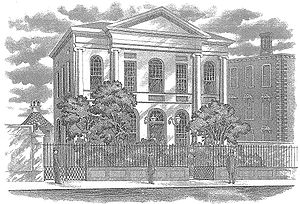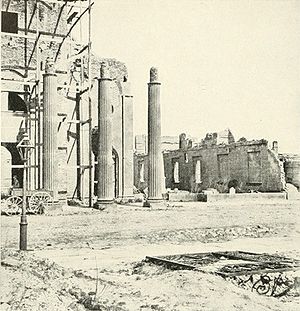
St. Andrew's Hall
Encyclopedia


Charleston, South Carolina
Charleston is the second largest city in the U.S. state of South Carolina. It was made the county seat of Charleston County in 1901 when Charleston County was founded. The city's original name was Charles Towne in 1670, and it moved to its present location from a location on the west bank of the...
, South Carolina
South Carolina
South Carolina is a state in the Deep South of the United States that borders Georgia to the south, North Carolina to the north, and the Atlantic Ocean to the east. Originally part of the Province of Carolina, the Province of South Carolina was one of the 13 colonies that declared independence...
, on Broad Street. The hall served as headquarters for the St. Andrew's Society of Charleston, South Carolina
St. Andrew's Society of Charleston, South Carolina
The St. Andrew's Society of Charleston, South Carolina is located in Charleston, South Carolina and was founded by gentlemen Scottish immigrants to the American South in 1729. It is a charitable organization that gives assistance to orphans, widows, and others in the Charleston area. Its members...
. It was also an important part of the social life of upper-class
Upper class
In social science, the "upper class" is the group of people at the top of a social hierarchy. Members of an upper class may have great power over the allocation of resources and governmental policy in their area.- Historical meaning :...
Charlestonians. It was used for balls, banquets, concerts, and meetings of organizations like the South Carolina Jockey Club and the St. Cecilia Society
St. Cecilia Society
The St. Cecilia Society of Charleston, South Carolina, named for the traditional patron saint of music, was formed in 1766 as a private subscription concert organization. Over the next fifty-four years, its annual concert series formed the most sophisticated musical phenomenon in North America...
. The hall could also be used for lodging, and both President James Monroe
James Monroe
James Monroe was the fifth President of the United States . Monroe was the last president who was a Founding Father of the United States, and the last president from the Virginia dynasty and the Republican Generation...
and General Marquis de Lafayette stayed there.
On December 19, 1860, delegates from South Carolina met at St. Andrew's Hall to discuss possible secession
Secession
Secession is the act of withdrawing from an organization, union, or especially a political entity. Threats of secession also can be a strategy for achieving more limited goals.-Secession theory:...
from the United States. The following day, they met there again and voted 169 to 0 to secede. South Carolina delegates later ratified
Ratification
Ratification is a principal's approval of an act of its agent where the agent lacked authority to legally bind the principal. The term applies to private contract law, international treaties, and constitutionals in federations such as the United States and Canada.- Private law :In contract law, the...
the Confederate Constitution there on April 3, 1861. South Carolina was the first state to secede from the Union.
The St. Andrew's Hall was destroyed during a Charleston fire on 11–12 December 1861.

